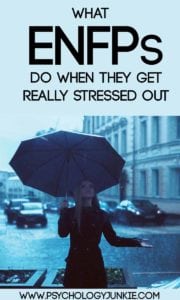What ENFPs Do When They Get Really Stressed Out
Every individual has a unique way that they experience and respond to stress based on their personality type. For ENFPs, a lot of stressors result from having to do activities and tasks that don’t line up with their preferences. For example, as intuitive-dominant types, they can become stressed when they have to focus on highly sensory activities and details. Over the years I’ve spent a lot of time studying personality type and stress, in fact, I’ve even written a book about it if you’re interested. In this article, I want to give you some helpful information on what stresses out ENFPs and how they can find relief in easy, actionable ways.
“The best remedy for those who are afraid, lonely or unhappy is to go outside, somewhere where they can be quiet, alone with the heavens, nature and God. Because only then does one feel that all is as it should be.”
– Anne Frank, ENFP
Not sure what your personality type is? Take our new personality questionnaire here. Or you can take the official MBTI® here.
First of all, what stresses out ENFPs?
- Being in a highly structured environment
- Rigidly enforced rules
- Repetitive, detailed tasks
- Having to focus entirely on the present moment
- Restrictions on brainstorming or envisioning the future
- Criticism or lack of harmony
- Having to rush through a project
- Overextending themselves
- Decreased outside stimulation
- Having to rush to make a decision
ENFPs are most stimulated and inspired by envisioning future possibilities and moving forward with ideas for the future. They look around them and see potential in everything, and they want to see more and experience more so that they can find ideas and new inspiration. Having to spend a lot of time focusing on mundane, repetitive details (like paperwork, data entry, dishwashing, etc,.) can make them feel bored, restless, and even depressed.
ENFPs are very empathetic, emotionally-rich individuals. They have very strong values and personal ethics. Having to be in conflict-ridden environments or do things that conflict with their deeply-held values will inevitably cause them stress.
As perceiving types, ENFPs dislike being bound by a rigid structure or deadlines that are set in stone. Being pressured into making a decision or commitment before they are ready will heighten tension and conflict resulting from their lack of decisiveness will only make things worse.
How ENFPs Respond to Stress:
There are two types of stress that ENFPs can experience: Everyday stress and grip stress. First, let’s talk about everyday stress.
Everyday Stress
Regular, everyday stress is unavoidable and will result in the ENFP becoming more “ENFP-like” or true-to-type. Under stress, they will naturally resort to using their intuition to solve a problem. They will try to find a possibility that will fix the problem or to brainstorm a solution. If that doesn’t work, or after trying that, they may get in touch with their feelings and try to determine what the morally right course of action is or what will coincide with their emotions and values.
During everyday stress, the ENFP may overextend themselves or procrastinate. They may see so many possibilities or get so caught up brainstorming ideas that they get even more stressed out because they haven’t dealt with the problem at hand yet. They may become more sensitive or irritable than normal and start to feel alienated or lost. If they can’t find a way to manage the stress using one of their primary functions (Intuition or Feeling) then they may fall into the grip of their inferior function.
“Grip” Stress
ENFPs can have a grip stress reaction when they are under severe, chronic stress, or when they have worn out their dominant or auxiliary functions (intuition or feeling) and can no longer access them. When this happens they fall into the grip of their inferior function; Introverted Sensing. An ENFP having a grip stress reaction will seem more like an unhealthy ISTJ. This happens because they have worn down their dominant and auxiliary functions so that they are now inferior and tertiary, and their inferior function tries to come in and “save the day” therefore takes over the personality.
ENFPs who are in the grip will seem unlike themselves in many ways. They can become obsessive and depressed, unable to see any possibilities or hope for the future. Instead of being driven by a sense of possibility, they feel like they have tunnel-vision and can only focus on their past mistakes. Often they feel oppressed by minor bodily sensations and worry about whether or not they are suffering from a serious illness or are at physical risk. They may feel paralyzed and unable to communicate clearly, as their thinking becomes cloudy and convoluted. Instead of their typical optimism, they feel overwhelmed, out of control, unable to sort out their priorities, and inflexible. Some become obsessed with record-keeping, cleaning, or other mundane household tasks that would normally never appeal to them.
7 Ways ENFPs Can Get Relief From Stress:
#1 – Get Some Time Alone
Getting away from stimulation and other people can help ENFPs to sort out their own emotions and feelings via their auxiliary function, introverted feeling. They can re-center themselves on what’s important to them personally and rid themselves of extraneous worries and concerns.
#2 – Exercise
Exercise is an excellent coping mechanism for any personality type. Exercise releases powerful endorphins in the brain that reduce stress and clear the mind.
#3 – Listen to Music
Music can help the ENFP to get in touch with their emotions and feelings and sort them out. It can also inspire them and help them delve into their rich imagination and sense of hope. Many ENFPs mention blasting music while they exercise, while they’re home alone, or on a drive home from work as a great way to feel better and find equilibrium.
#4 – Meditate or Pray
Meditation or prayer helps the ENFP to calm down their mind, re-focus themselves, and get back in touch with their body. ENFPs who are stuck in brainstorming mode for too long can start to feel pulled in a thousand different directions and lose touch of their physical self and tangible needs. A calming moment to get in touch with spirituality, nature, or inner body sensations can transform their mood.
#5 – Get a Change of Scenery
ENFPs are inspired by new and novel experiences; they have an unquenchable desire to explore and find new adventures. Getting away from a stressful situation and seeing a new place, engaging in a new atmosphere, or just getting out in nature can really help them to be inspired and get a fresh perspective on what has been bothering them.
#6 – Sleep
ENFPs minds are often so active and full of ideas that they can burn themselves out. They tend to ignore their physical needs more than other types because they get so caught up in their visions and possibilities. Taking a break from it all when they start to get overwhelmed is important. Many ENFPs report that taking a quick nap or even just going to bed early can help them to feel refreshed and give them a new perspective on whatever is causing them stress.
#7 – Talk to Yourself Logically
ENFPs, along with most other personality types, can find their way out of a grip reaction by accessing their relief function. In the case of the ENFP, the relief function is Extraverted Thinking. This function is often a pathway out of grip stress, pulling the ENFP away from their inferior sensing response, and their worn-out intuition and feeling. Being able to get alone and talk out a problem, its cause, and the reason it’s creating stress can help the ENFP to come up with a logical solution or plan to solve it.
What Are Your Thoughts?
Do you have any stress-relief tips to add? What helps you to find calm in the midst of overwhelm? Let other readers know in the comments! Find out more about your personality type in our eBook, Discovering You: Unlocking the Power of Personality Type.
Other Articles You’ll Love:
3 Weird and Wonderful Secrets About the ENFP
10 Things You’ll Relate to If You’re an ENFP
The Teenage Struggles of Every Myers-Briggs® Personality Type











The film doesn’t have sound…otherwise–a great article!
Thanks — stressed to the point of not being able to talk. Going for a walk now. I normally know to do that, needed to be told today.
Thank you. Extremely insightful and soothing for me.
Thanks. Very useful.
Absolutely true. I’m ENFP and have experienced depression. Those are exactly what I did back then and it worked amazingly.
Now in lockdown 13 weeks, I’m stressed out and I understand more why, you’re explanation of why is spot on.
Thank you for understanding us
I will use your article like a wise guide
Thank you 🙂
Absolutely true. I’m ENFP and have experienced depression. Those are exactly what I did back then and it worked amazingly.
Now in lockdown 13 weeks, I’m stressed out and I understand more why, you’re explanation of why is spot on.
Thank you for understanding us
I will use your article like a wise guide
Thank you 🙂
Thanks Susan for this awesome article! It has been really helpful to know what is happening to my ENFP friend when he’s down in the dumps! Just one thing I would hope to clarify though – I wonder if you might agree that the ENFP is more *sympathetic* than empathetic. This claim can be justified by looking at their function stack which prioritises inward feeling (Fi – their auxiliary) while outward feeling (Fe) belongs in their shadow type. I think it’s an important distinction as people can sometimes get frustrated by the ENFP’s inability to empathise; occasionally reporting them as shellfish. What do you think about this? 😉
This has made me even more sure that I’m an ENFP it’s exactly what I experience thank you so much this is very relieving to know 🙂
I am reminded of my strong ENFP personality type whenI am in my grip. Too much data, deadlines and paperwork make me withdraw from friends and social activities- go into my cave and work on those things that are mentioned to get back to my normal self. When in my grip my focus is on details- everywhere I look- I need someone to help take care of all these small details so I can go back to my big picture thinking.
This all resonates so much, as I have been caught in grip stress for a few years now and working hard to pull out. I find that guided mediation is clutch! My mind races too quickly, from being an ENFP with Cptsd, and I found mediation on my own beyond difficult. But my imagination loves to follow and focus on a good guided meditation! The voice does wonders for my focus.